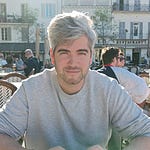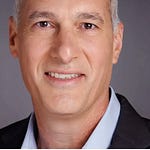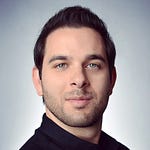The Green Techpreneur (GT) is here to #SparkTheTransition to a world where people, planet and profit align. We are a springboard platform for climate tech startups: we offer an investor/startup marketplace to help you raise funds and a magazine/podcast to share innovation and insight – by founders for founders. Join our network of over 5,200 climate tech entrepreneurs, investors, and sustainability warriors who are moving the needle on climate change.
Investors take note:
Ourobio - a synthetic biology and fermentation startup has just announced their pre-Seed/Seed round, in which they are targeting a raise ~$2M to construct their pilot fermentation line to deliver the first kilograms of PHA and pigment to customers, initiate material certification, secure long-term commercial offtake agreements, improve yields to scale production further to 1 tpa, file PCT and continuation in-part conversion applications, and bring new members onto their team. For investment enquiries, contact: abrewer@ourobio.com
Pluri’s Coffeesai - is raising $6.5 million to scale a ground-breaking solution in cell coffee production. It harnesses two decades of biotechnological expertise to deliver 100% authentic coffee through cellular agriculture, reducing water usage by 98% compared to traditional methods. Watch this video to learn more. For investment enquiries, contact: Michal.ogolnik@pluri-biotech.com
Together with co-founders Aslan Shamsutdin, Murshid M. Ali and Petter S. Berge, Pratik Ghoshal, CEO and Co-founder of Skyfri Technologies developed technology which could streamline and automate solar asset operations to make solar power cheaper and solar capital investment significantly more sustainable.
Skyfri’s technology targeted a genuine market pain point and within just a few months of launching, company growth soared by 500%. And with Skyfri’s solar asset management solution offering immediate savings of operating heads by 20-30% for power plants that were previously manually managed, their skyrocketing growth is hardly a surprise.
Backed by climate investors SpeedInvest, Singularity and Link Venture, Skyfri manages about 185 sites worldwide and is dramatically accelerating growth through targeted acquisitions.
Pratik says there was a strong element of right place, right time serendipity to Skyfri’s growth: the solar market was in desperate need of a better management solution, to a point where money and investors may have started to flow out of the space if more efficient ways of operating weren’t found.
But the most important component of Skyfri’s success, he says, was not the market or the service or technology they provide – it was the people behind the name.
“What’s the most important thing I’ve seen in my journey as an entrepreneur?
“It’s that your team is your biggest asset.
“Most of the time you fail as an entrepreneur because you just don’t have likeminded people. You don’t have people who you can depend on. Because you alone can’t be a one man army.
“For me, having a co-founding team, not just a co-founder, was the key for Skyfri.
“I do my 10% of the work, they their 90% of the work and we all do it together. If we hadn’t found that team, we probably wouldn’t be here,” says Pratik.
To launch and build Skyfri just before the pandemic shook the world, the co-founding team had to take a leap of faith; “we started recruiting people to work remote, that’s how we grew. It was six months before I even met my co-founders in person – by then we had already raised funds.”
His motto? “The entrepreneur’s job is to make the receptionist rich.”
In this Green Techpreneur interview, Pratik talks all things growth, solar and team-building.
Where did the idea behind Skyfri come from?
My co-founders were all serial entrepreneurs in Oslo, Norway. We’ve known each other since almost five years now - since 2017 when I was working as Head of Global Sales in a manufacturing company in Munich. They wanted to develop a solar project. I went my way and became a global asset manager in London, but we always kept in touch and thought we could one day do something together.
And incidentally, we found we were all facing similar issues. In 2020, we started connecting with each other; we had these solar power plants that didn’t work. We didn’t know what was happening, it was like a black box that we didn’t understand and our investment was at risk. So we decided to do something about it and we had a breakthrough from a technological point of view and that’s how Skyfri was born.
What are key elements to working together successfully as co-founders?
The most important thing is, you all share a common vision, you all have the same pain points, and you all are frustrated with the status quo. You have to be frustrated with the status quo to start something new. There’s no way the world moves ahead with incremental changes, you have to change things overnight, or at least have the ambition to change things.
What does your technology do?
We wanted to make solar plant management more systemized, we wanted to modernise it with automation. We target and transform three key underperformance areas:
We identify energy losses in real-time
When reporting happens on the asset management, you get a report after a month or a quarter and you suddenly realise that some of your plants didn't work. Something burnt out and needed replacement and by the time you know you already lost revenue and need to spend more to fix the issues. So we wanted to know exactly when things fail, or even futuristically predict when they might finish or start showing signs of underperformance. That's real-time management.
We break the silos
We wanted to fundamentally change the system of operations, accounting and monitoring as siloed systems to have this be a single source of truth in a single integrated platform.
We do all of this autonomously
The algorithm runs on machine learning, deep learning setup, and it monitors solar plants and does things automatically that previously needed a 20–30 member team depending on portfolio size. So the final value proposition to the investor goes back in the form of increased rate of return.
What’s your knock-on impact on the solar industry?
20 years ago it cost 5 million Euros to build one megawatt of solar power – now that figure is just 0.5 million Euros per megawatt: because of the immense drop in capital expenditure, it has already become a mainstream class asset but what would have derailed its potential is the lack of management of the solar power plants – and that's where we come in. We are seeing an increased amount of investment and we want to not only sustain that money, we want more to come in to reduce global warming.
If we had not done it, we probably would see the capital drain out of renewable energy investments.
What is it about entrepreneurship that gives you that kick, and makes you go ‘yes, this is what I want to do!’?
You of course have your freedom of thought, everyone has it in a free world. But the freedom of execution to channel the energy that you have without having to stick to a frame structure which already exists is what's most interesting.
And the second thing is, at the beginning of entrepreneurship, there’s a lot of energy and that's what makes you get up in the morning, and like my wife says, I’m less of a thinker than a doer. I like to do things, so there’s no better avenue than entrepreneurship.
Can you describe your entrepreneurial journey in three words?
Extremely busy, very interesting, very scary
What’s the scariest part about being a climatetech entrepreneur?
The scariest part is, ‘what if the team doesn’t feel the same way tomorrow?’
I’m not worried about the market, because it’s clear, the market is there, but I want the team to be equally passionate and what if tomorrow we wake up and start to see a lot of disconnect in the team? That’s the scary part. To keep everyone motivated in the team – that’s our biggest asset by far – I cannot overstate this.
The team has to stick together. Family is a cliche, but it’s a common vision, common mission that the team has to always feel, to always want to stay ahead of the curve by asking the most critical and even unpleasant questions – this is the motivation I want to see everyday in my team.
How do you create that team spirit?
We dislike the idea that there’s a value statement – because no one reads them – and the values may change over time.
What we think is there’s one value that doesn’t change and that is a sense of care. Care for each other, care for the people with whom you spend 85% of your waking time with.
And that care automatically translates into care for your customer. If you care for the customer and stand by them when they need help the most, that’s when you create lifelong loyalty.
And you can’t write it on the wall, so someone reads it and says; ‘I’ll be caring, I’ll be caring, I’ll be caring.’ It has to be your natural self, so he or she sees that care happening in the company all the time.
In the face of climate chaos, what gives you hope for the future?
I give a lot of credit to the youth of today. You have Greta Thunberg and she has inspired a whole generation of youth. They don't have the data points, but they just get it with the snap of a finger, that this is not sustainable, this is not how they want to live. That’s the movement that is happening in front of the line.
The second credit goes to the community of scientists that have been working tirelessly to prove beyond shadow of doubt that climate change is happening and we should do something about it.
If you could teleport yourself into your future, where would you be?
The company Skyfri would still be creating a lot of value as one of the most trusted and dependable in the internet enabled space. We will try to win the solar world and we’ll play a role in virtual power plants, the smart grid, anything that is on the supply side.
I don’t know what management capacity I’ll be in 10 years from now, because it’s nice to make room for the next generation to manage the company and we as co-founders step down at some point in time. I believe in that. But I want to be involved with everything that has to do with encouraging a sustainable lifestyle.
Thank you for reading and listening to The Green Techpreneur, have a good weekend!
#SparkTheTransition,
Marianne
















Share this post